Real Estate App Development Services: What Businesses Need to Know
September 20, 2024 • 174 Views • 29 min read
Bohdan Vasylkiv
CEO & Co-Founder
Real estate app development is an upcoming trend in the modern world. There are multiple reasons why this type of software is gaining popularity nowadays. Still, the real estate market is not our expertise, so let’s switch to a more related topic — software development.
One of the most common challenges in real estate app development is the lack of software development expertise. Simply put, most real estate companies don’t have software developers on board capable of delivering the required product.
As a result, such businesses have two ways to satisfy their need for software products:
- Find and hire an in-house development team and maintain it.
- Cooperate with an outsourced real estate app development company.
Each strategy has pros and cons and can benefit specific contexts. First, we must learn the basics of real estate app development solutions to choose the most suitable approach.
Types of Real Estate App Development
Like any other custom development, real estate software development can vary depending on your goals and needs. With enough time and resources, you can develop a full-fledged application accessible from all devices.
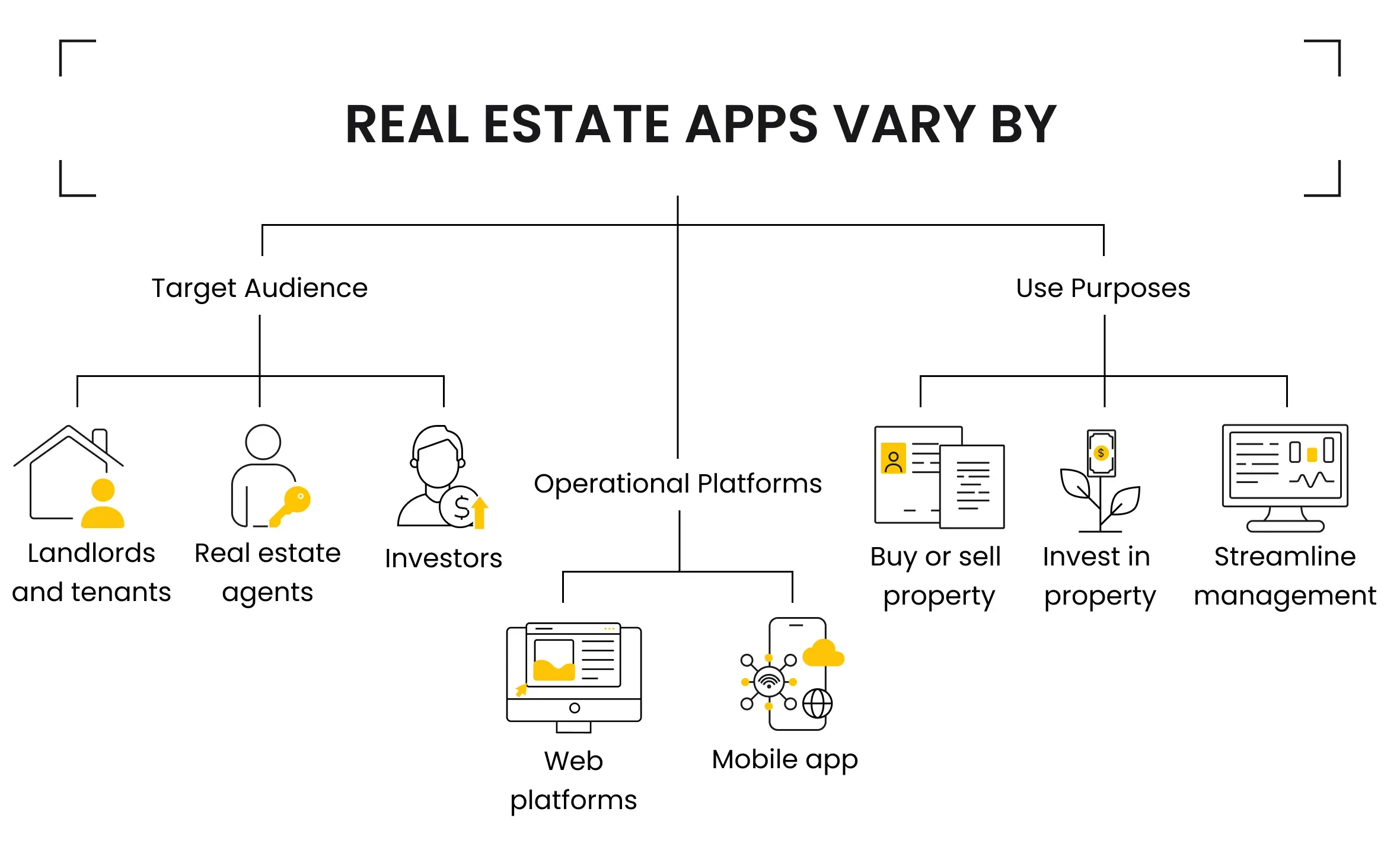
However, the most efficient and competitive multi-platform real estate app demands custom mobile app development for real estate in addition to web and desktop development.
Alternatively, if you have limited resources or very particular goals, you can choose either custom mobile app development services or building a web application. To illustrate the variation of possible outcomes, it is better to define what real estate app development types exist.
We can divide real estate apps by three main factors:
- Operational platforms
- Target audiences
- Use purposes
The operational platforms type is self-explanatory. It defines what devices can support future applications and the possible tech stack or other development tools.
Real estate apps by target audience are also apparent. To cut a long story short, there are a few major target users of such software solutions:
- People, who are looking to rent/buy property
- Real estate agents and companies
- Potential property investors
At the same time, property apps “by use purposes” vary in functionality — for example, management systems, listings apps, online marketplaces, or investment platforms. These types of applications also commonly depend on the target audience.
However, you must choose each subtype during real estate app development: select the suited operational platform for your software, the primary use purposes for your solution, and, of course, learn your target audience to meet its requirements and demands. The target audience may be the most crucial aspect, impacting other choices.
However, all the preceding don’t explain why you might need to build your own real estate app and what benefits it can bring.
Benefits of Developing a Real Estate Mobile App
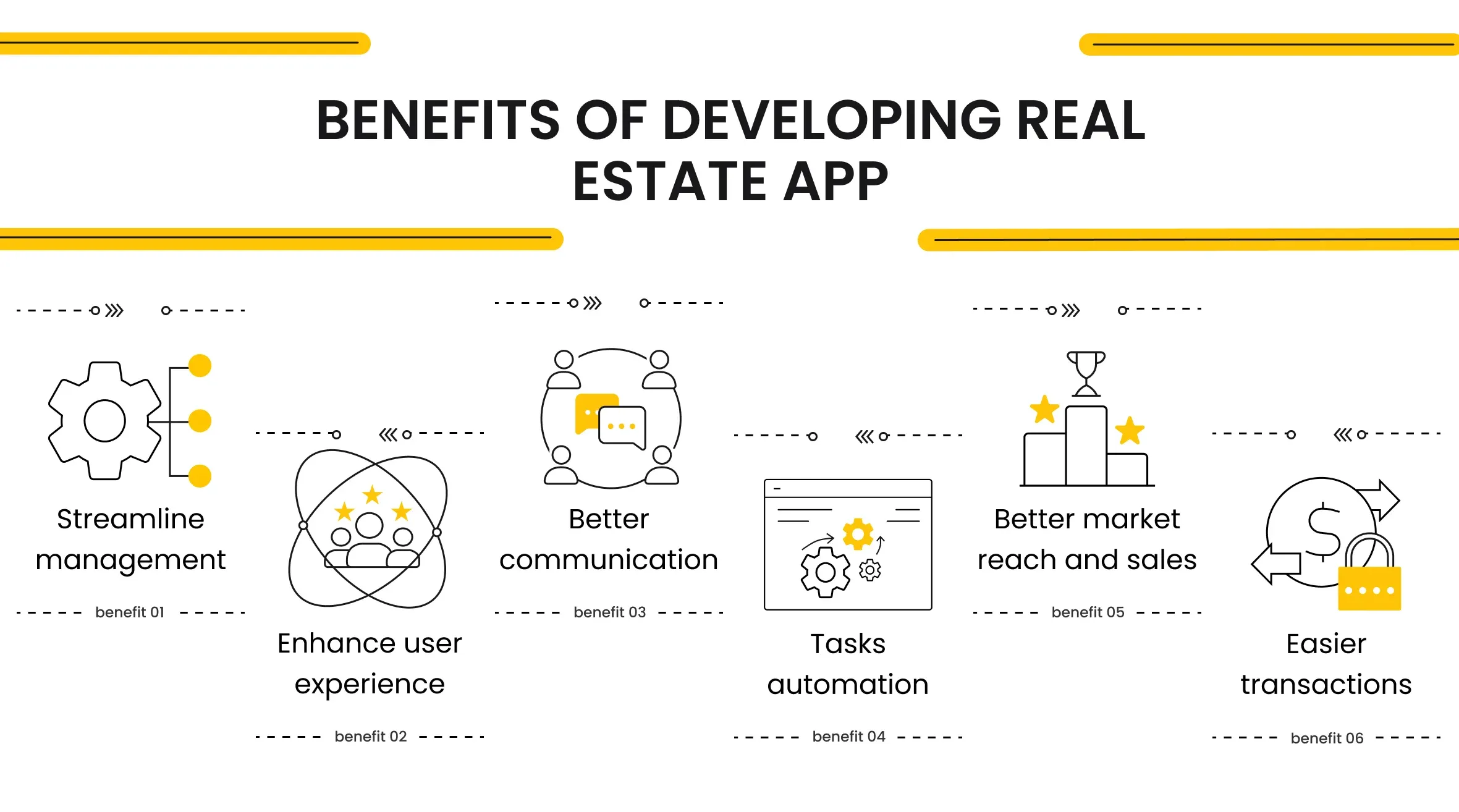
It is possible to form a list of the main benefits of developing a real estate mobile app. Real estate app development solutions can help with:
- Streamlining Property Management
- Enhancing User Experience for Buyers and Renters
- Improving Communication and Transparency
- Automating Administrative Tasks
- Increasing Market Reach and Sales
- Simplifying Transactions and Documentation
Streamlining Property Management and Automating Administrative Tasks
One crucial advantage of custom-made property apps is enhanced and automated property management. Developing a real estate software solution helps businesses automate and improve asset management by setting status updates and automated list extensions.
Like any other modern business, real estate companies have to deal with a lot of data. For instance, property listings are databases with all the required information about available assets for renting and selling. These property lists are usually easily distributed among real estate firms and independent realtors to inform them about open options on the market.
Alternatively, many more prominent companies have their databases under the hood, which include data and other information about other special offers or regular clients.
Frankly, management software is a widespread phenomenon commonly used in industries such as eCommerce, EdTech, healthcare, and others. Yet, unlike property management app development, management solutions in other sectors automate various administrative and management tasks.
Administrative automation is also used in the real estate business as well. However, it is instead an improved and upscaled software that covers both property and administrative management.
Enhancing User Experience and Increasing Market Search and Sales
Highly efficient and user-friendly software designed to meet the demands and expectations is always a great addition to any business.
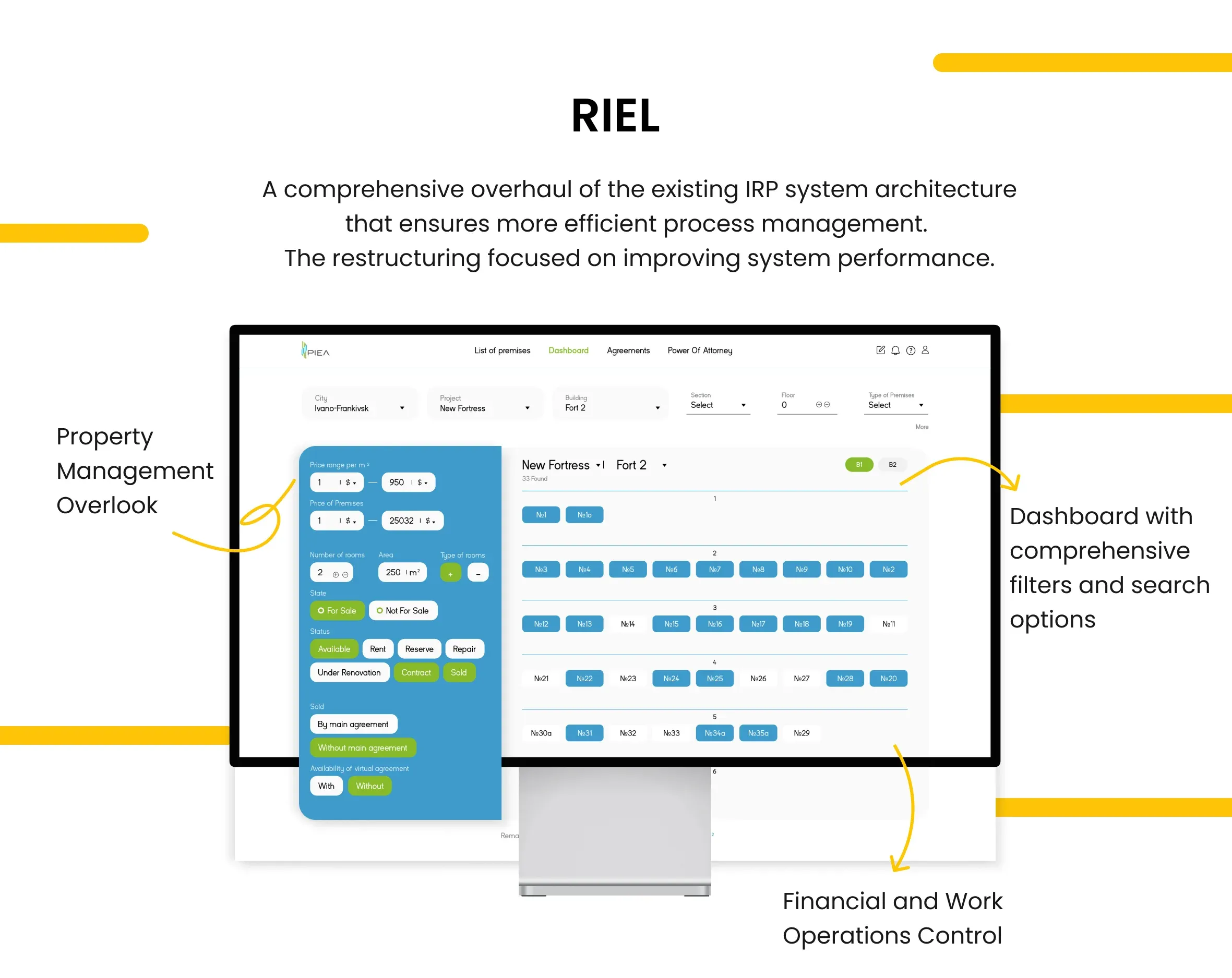
Still, even a basic version of the real estate marketplace significantly improves customer relations and satisfaction. For instance, even an MVP version of a real estate application opens new markets for you and offers your TA more convenient tools to search through the available options.
Nevertheless, it doesn’t mean you shouldn’t consider improving your software product. Remember that MVP or conventional application is the minimum to stay afloat. After delivering a software solution to your clients, you must analyze the market and users’ feedback to learn how to improve your services.
Improving Communication and Transparency
A centralized platform is an obvious advantage that helps enhance and improve your communication and transparency with the customers.
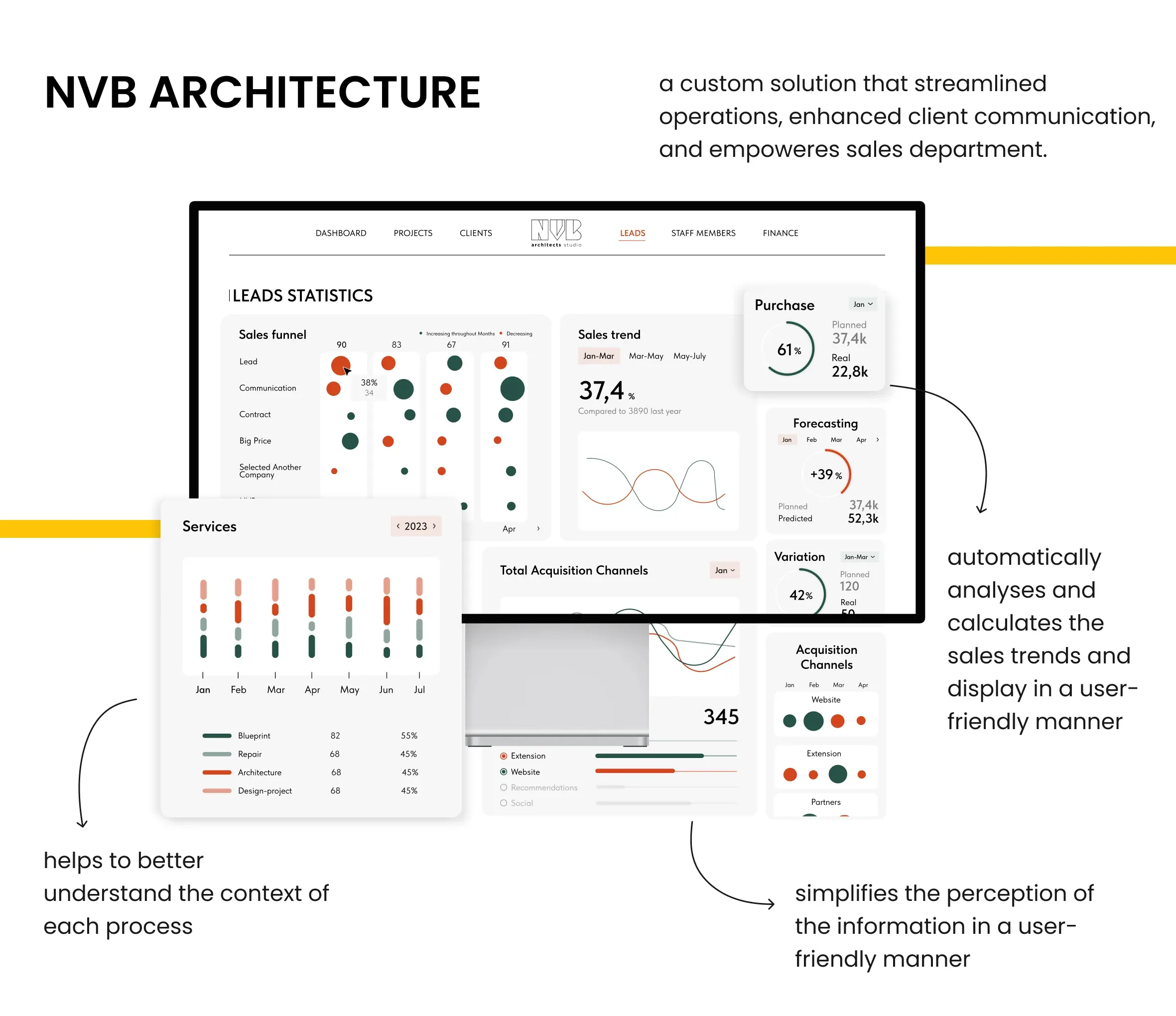
First, you can create a built-in messaging feature that allows your users to communicate directly in the app. Such functionality is useful for renters and landlords and increases user engagement, creating a win-win situation for all parties.
Besides, you can enhance communication and transparency even more by integrating payment gateways and allowing to share files or other documentation. Therefore, your application can become an incredibly convenient space for all participants, allowing them to perform operations as effortlessly as possible.
Nevertheless, we STRONGLY RECOMMEND YOU discuss such features with your lawyers first: most likely, you will become a full-fledged intermediary by the law in specific regions and countries, which also brings extra responsibilities to your company as a deal participant.
Key Considerations Before Developing a Real Estate App
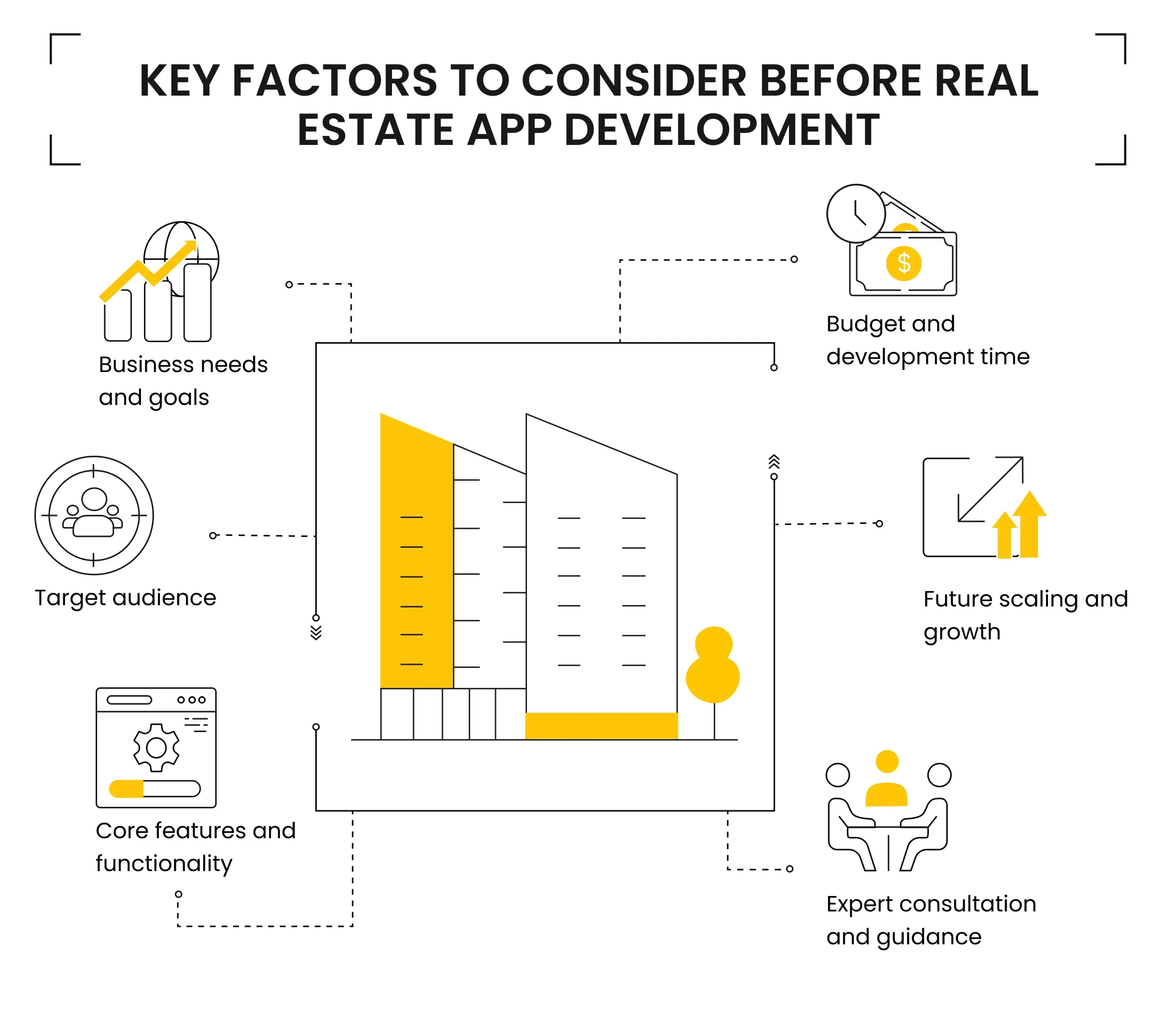
Apart from considering feature integrations, which can bring some extra responsibilities for your business, during real estate app development, you also should pay attention to:
- Assessing Business Needs and Goals
- Identifying Target Audience
- Prioritizing Key Features and Functionalities
- Evaluating Budget and Timeline
- Considering Scalability and Future Growth
- Seeking Expert Consultation and Development Services
Business Needs and Goals
As mentioned before, the main goal of custom software development is to meet particular business goals and needs.
Your business requirements and goals are the most crucial factors that directly impact the final software functionality. Therefore, it is essential to define them as clearly as possible. This includes generic purposes like creating a management system or online marketplace. In fact, the more detailed your project requirements are - the better for you.
Having the most detailed explanation of what you expect helps real estate app developers shape the development project, choose the correct technologies, forecast further scaling, etc.
For example, suppose you have limited resources but still demand multi-platform accessibility. In that case, your consulting partners can suggest Ionic app development services instead of developing a few standalone software solutions. Therefore, you can significantly cut the expenses and app development time, but you will also sacrifice its usability and functionality.
Target Audience
Still, business goals and needs are just a part of this equation. After defining your primary goals, you also should consider your target audience and its correlation with the current setup.
For illustration, Ionic-based software offers multi-platform access, potentially increasing your TA and market reach. However, if most customers prioritize mobile devices to use your services or your rivals’ products, it might be more reasonable to choose React Native app development services.
As a result, you will build a real estate app that is in between hybrid and native mobile applications:
On the one hand, it offers more flexibility. It also supports native-like real estate mobile app development, allowing the use of more features and functionality and achieving better performance results.
At the same time, the development methodology is almost the same for both iOS and Android operational platforms, demanding a single development lifecycle for both systems with slight final changes.
Key Features and Functionalities
Choosing the correct development technologies is also impacted by the required app functionality.
Once again, native applications offer more features and options to interact with them while being more complex and demanding in terms of development.
Alternatively, hybrid applications or web development are much easier and faster than real estate mobile app development but suffer more strict functional limitations.
Eventually, you must sacrifice something in each case to achieve the desired result. Still, we highly recommend prioritizing software functionality and features over time and materials. It will be difficult and cost more, yet it is more beneficial in the long term, giving your business space for maneuvering, scaling, and upgrading.
Budget and Timeline
Despite the ambition to achieve the best possible quality of software products and embody as many features as possible, let’s be fair: sustaining a neverending software development with an unlimited budget is impossible.
Therefore, even if you prioritize functionality over available resources, it doesn’t mean you should ignore them.
So, to succeed, you must evaluate the available budget and time you can spend on real estate app development. The best way is to apply agile software development methodology when you have a rough project estimation yet can prioritize certain practices over the planned tasks.
Scalability and Future Growth
You DON’T NEED to embody all the features at once. One of the best and most efficient practices in modern software development is keeping up with MVP startup development.
To simplify, minimum viable product development aims to create the most basic version of your planned product and push it to live as soon as possible. So, even with limited time and resources, businesses can build a real estate app with the minimum functionality, leaving the rest of the planned features for later.
As a result, the company can start operating software and test plans by gathering users’ feedback and reviews, and learning their actual demands and expectations.
MVP development is a win-win strategy for everyone: businesses get operating software, and users can impact an app's further scaling and growth. Finally, real estate app developers can design the development lifecycle with the intention of future scaling, ensuring that infrastructure will support it without the need to reshape it.
Expert Consultation and Development Services
Eventually, finding an expert consultation is your best choice before starting real estate mobile app development.
Getting an expert’s opinion on any topic is always beneficial. It can give you some market insights and help you better plan future projects. Besides, you can benefit even more by choosing custom software development services on demand.
The only scenario when you should doubt expert consultation - is if you are an expert yourself. However, it applies not only to real estate market expertise but also to software development.
Otherwise, don’t underestimate the importance of such options and use them. Moreover, many software development companies partly share their experience for free during the project discovery and estimation phase. The main challenge, though, is finding a reliable real estate app development company with proven experience in the industry.
How to Find Your App Development Partner?
Fortunately, if you need a real estate mobile app development partner, countless supplemental tools and platforms can significantly simplify the process of finding a reliable, dedicated software development team.
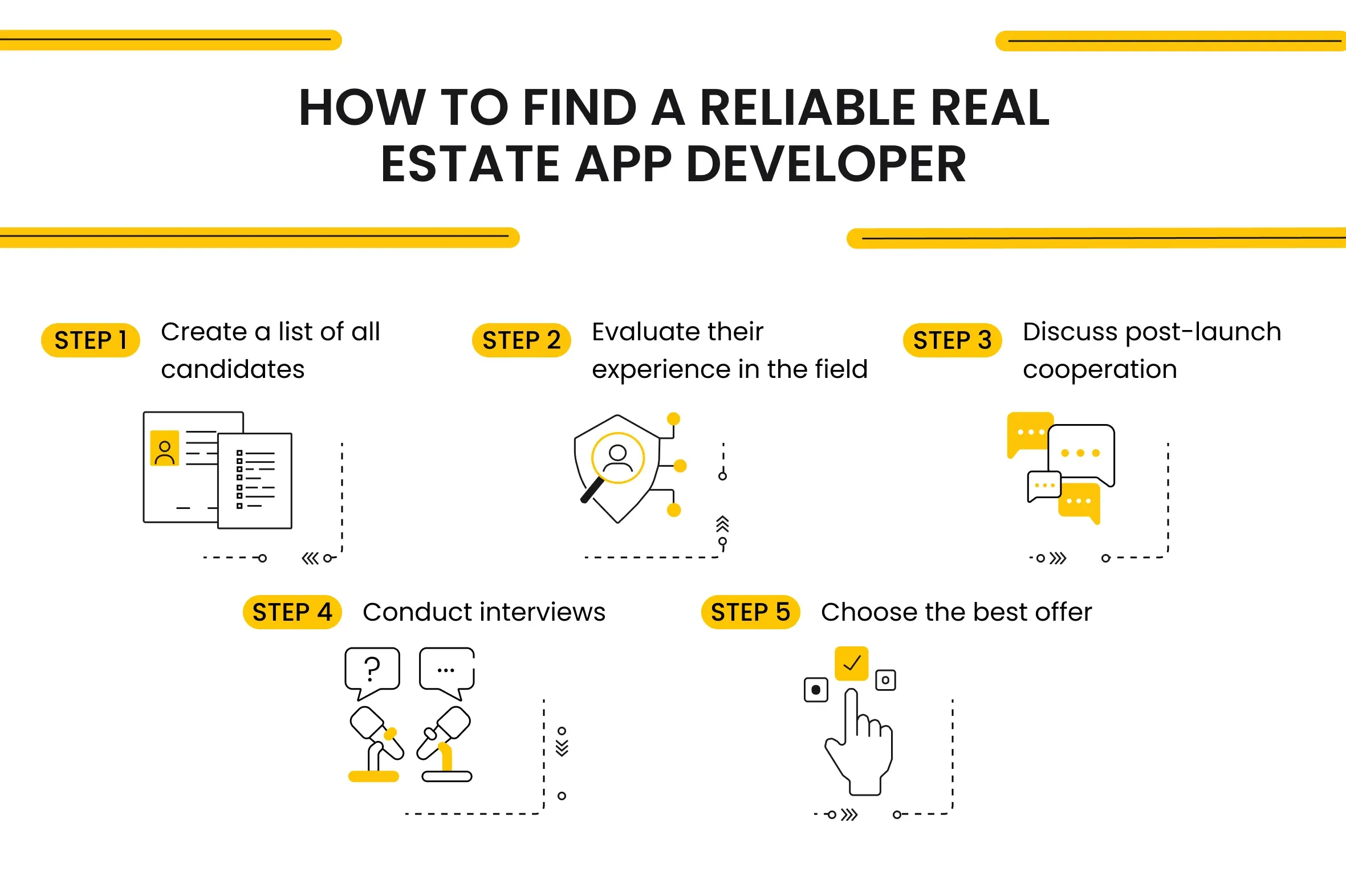
To make your struggle even easier, we also created a checklist of how to find an app development partner:
- Search for potential development companies
- Evaluate their expertise and capabilities
- Consider and discuss post-launch support and maintenance
- Conduct Interviews
- Choose the best offer and sign agreements
Research Potential Development Companies
First, you need a list of potential technological partners competent to deliver the required software product.
The easiest way to search for real estate mobile app development services - is to visit B2B platforms like Clutch, GoodFirms, or similar ones. These websites gather information about various outsourcing teams and companies, creating and displaying their portfolios and client feedback.
It is a great start because you can easily find a number of the best candidates with reviews and ratings, find at least rough development costs, and learn the niches in which these businesses are competent.
Nevertheless, remember that finding a development partner is just the first step. Consider it as a list of names, not ready-made research.
Evaluate Their Expertise and Capabilities
The next step is to examine and evaluate the experience and expertise of chosen development teams.
B2B platforms can give you an approximate understanding of the niches and specifications of chosen software development vendors. Nevertheless, you will need to perform your observation and research. The best way to do so - is to visit a company’s website.
Most IT companies detail everything related to their services on their websites. In other words, you can find a detailed explanation of their services, how the cooperation will look, what technologies they are familiar with, and, most importantly, their previous experience.
Case studies usually describe experience and expertise, where the development company explains previous projects and their goals. They are also much easier and more intuitive, demonstrating tasks without overcomplicated technological explanations. This is excellent for those unfamiliar with software development or with a minimal understanding of this industry.
Consider Post-Launch Support and Maintenance
After narrowing down the list of potential candidates who meet your expectations and have experience in real estate application development, you must examine their services even deeper.
Every detail matters. However, one of the most important factors to consider is whether the company provides you with post-launch support and maintenance.
Simply put, it is not enough to create real estate app. Software development is a complex and crucial process that takes the most time and resources. Nevertheless, it is only possible if your real estate app developer stays for some time after launching the product.
Post-launch support and maintenance are needed to ensure everything works as supposed, polish the final product, confirm its performance and stability, etc. During this stage, developers can also fix some minor bugs or issues that were left behind.
Finally, software engineers can prepare the launched product for further scaling and improvement, leave comments in code samples, and clarify the project documentation for future development.
So, ensuring that your candidates include post-launch support in their services is vital.
Conduct Interviews
After all the proceedings, you can conduct interviews with chosen software development companies.
To efficiently interview a development company, you must:
- Discuss previous experience in your industry
- Ask for the case studies most related to your project
- Talk about the cooperation terms and agreements
- Prepare tests to check the capability of developers
- Request rough estimation and project discovery
These are just the most basic topics to cover during the interview. You can ask questions about your potential collaboration and software product development processes. Still, to shape your future questions, you should also learn the basics of the real estate application development process.
Real Estate App Development Process
The real estate app development process is generally similar to any other software project. The differences between industry-specific development and general software creation lie in the details, while the phases are all the same.
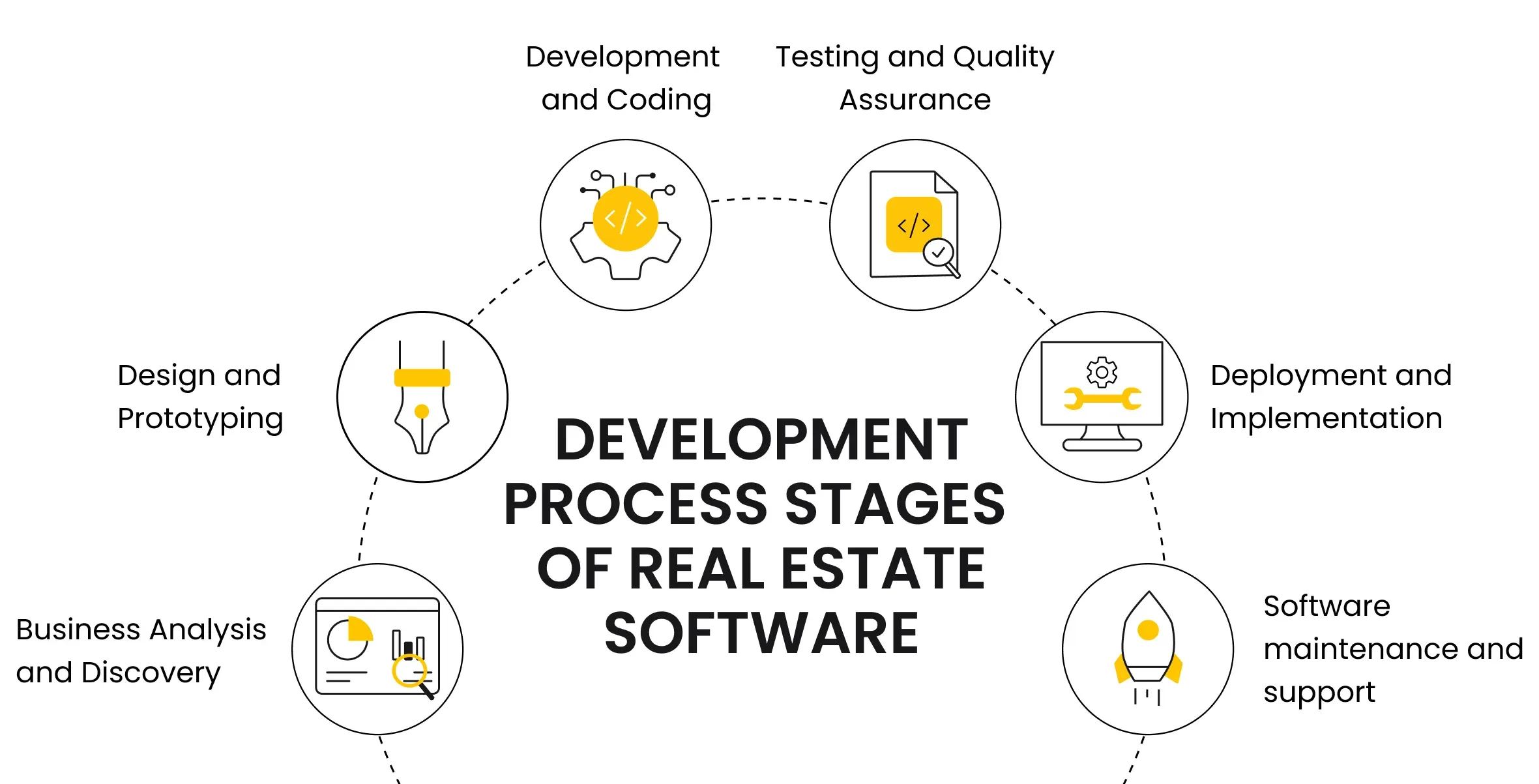
Business Analysis
Before starting the development process, you must conduct business and market research.
As a result, you can define the goals and software requirements in your industry or niche. Knowing these basics is essential for building any software product, whether a custom app, MVP, or other software solution.
Knowing the basics helps to:
- Define the core features and functionality
- Understand the undergoing processes
- Learn the ways to improve and scale your software
- Figure out whether your ideas meet the reality
- Shape the future project and its development plan
Design and User Experience
After learning the basics and knowing what is expecting you in the future, you have to visualize the product.
Every software development company will design a prototype of a future software solution. Don’t mistake it for user interface designs. UI is one aspect of prototyping that must be fulfilled.
Apart from interfaces and the final look of an app, prototype design includes explaining “unseen” processes and components, such as the structure of IT infrastructure and software architecture.
Moreover, the business owner and the development team require a software prototype. It illustrates the ideal final result and explains to all parties what they are expected to achieve.
Apart from looking at the future product, each participant can also participate in its discussion: product owners can require changes, while developers state what can cause issues, what is optional, and what can be improved or avoided.
Development and Integration
After agreeing on the project prototype, software engineers can proceed to the main stage and start software development.
While real estate app developers embody and bring ideas to life, business owners mainly engage in management and discussions, which usually happen as daily standups between business owners and developers.
During these meetings, the team describes the development progress and discusses everything related to development. For instance, they suggest prioritizing urgent tasks or integrating unplanned features.
Testing and Quality Assurance
After developing a working software application, developers must ensure its quality by testing, hunting down bugs, and fixing them.
Testing and quality assurance are commonly engaged from the beginning after the first components are coded. Nevertheless, the QA team usually finds and highlights everything they see. Still, most unimportant bugs and issues are typically fixed after the development to avoid interfering with the development and its pace.
In other words, even if QA specialists are engaged from the start, most bugs are fixed during the testing and QA phases.
Deployment and Maintenance
After fixing most of the bugs and ensuring software quality, developers can start the application deployment and maintenance process.
At this stage, the development team ensures everything is successfully deployed, and the software runs smoothly. Post-launch maintenance has a lot in common with testing and QA. The only difference is that regular users are also involved in finding and reporting bugs during maintenance.
Surely, more bugs will emerge after the software is launched because the number of users will be larger than the number of QA specialists. Besides, after deploying an app, other issues may appear. So, it is crucial to ensure that your developers stay with you at least for a while after going live.
Advantages of Our Real Estate App Development Services
We will explain how we do it in Incora to illustrate how efficient real estate mobile app development services are.
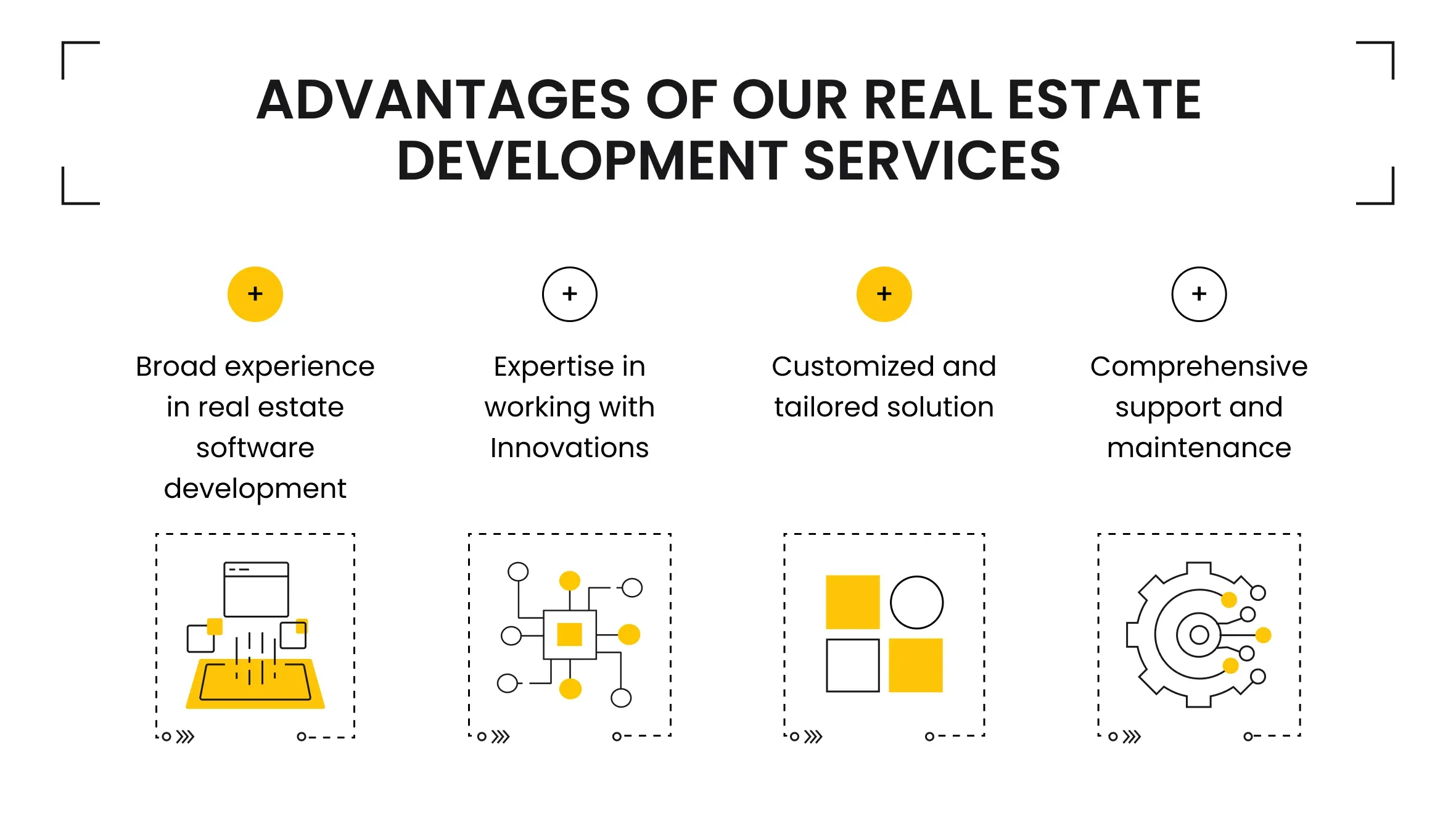
Customized Solutions
First of all, software development customization. We are confident that any software development must be custom-first.
We don’t mean that every software project must be built from scratch. However, if you have a chance to create a conventional app or create real estate app with customization options - the second is better.
Thus, we encourage all of our clients to consider custom development from scratch, even if it is far out of the budget. Creating a customized solution, starting with MVP or other compromises, is possible.
However, if the custom approach is defined from the start, it is possible to design IT infrastructure and architecture that are more adjustable and suitable for future scaling and improvement.
Expertise and Experience in Real Estate Software Development
We have proven experience in developing and delivering software applications for the real estate industry. Moreover, these projects are different in terms of use and type. Primarily, these are management systems, yet they also include various integrations like AI-driven chatbots and other real estate app development solutions.
Advanced Technologies
Our dedicated real estate app developers are competent in building industry-specific software solutions and are familiar with advanced and innovative solutions.
Moreover, we have already successfully integrated innovative solutions, such as an AI chatbot, for custom support and satisfaction regarding real estate app development and upgrading.
Comprehensive Support and Maintenance
Eventually, our company suggests comprehensive post-launch support and maintenance to ensure the final quality of the software product and check if everything works as expected.
If you need more details and a rough project estimation, contact us directly. We will gladly answer all your questions.
What’s your impression after reading this?
Love it!
1
Valuable
1
Exciting
1
Unsatisfied
1
FAQ
Let us address your doubts and clarify key points from the article for better understanding.
How long does it take to develop a real estate app?
The development timeline for a real estate app depends on various factors, such as:
-
Complexity and Features: A basic app with simple property listings, search, and contact features may take 3 to 6 months. More advanced features, like map integration, virtual tours, chat, or payment gateways, can extend the timeline to 6 to 9 months or more.
-
Team Size and Expertise: A larger, experienced team may complete development faster, while smaller teams or those with less experience could take longer.
-
Platforms: Developing for both iOS and Android can take longer than focusing on a single platform.
-
Third-Party Integrations: If the app integrates external services like MLS databases, APIs, or other tools, additional time is needed for testing and ensuring compatibility.
-
Testing and Iteration: The testing phase, including user feedback and bug fixes, adds time to the overall development process.
Overall, the timeline ranges from a few months for simple apps to nearly a year for feature-rich, highly customized solutions.
What are the latest trends in real estate app development?
The latest trends in real estate app development include:
- AI and Chatbots for personalized property recommendations and customer support.
- Virtual Tours and Augmented Reality (AR) to allow users to explore properties remotely.
- Blockchain for secure transactions and smart contracts.
- Big Data and Predictive Analytics for market insights and property value predictions.
- Mobile Payments and Financing Tools for seamless real estate transactions.
- Sustainability Features highlighting eco-friendly properties and energy efficiency metrics.
These innovations enhance user experience and streamline real estate processes.
Can I integrate my real estate app with other systems or tools?
Yes, you can integrate your real estate app with other systems or tools. Common integrations include:
- MLS (Multiple Listing Service) for real-time property listings.
- CRM systems to manage leads and client relationships.
- Payment gateways for seamless transactions.
- Analytics tools to track user behavior and app performance.
- Marketing platforms for automated campaigns.
These integrations enhance functionality and improve the user experience.
How do I determine the budget for my real estate app development?
To determine the budget for your real estate app development, consider factors like:
- App Complexity: Simple apps cost less, while advanced features (e.g., virtual tours, chatbots) increase the price.
- Development Team: Costs vary based on whether you hire freelancers, an in-house team, or an agency.
- Platforms: Developing for both iOS and Android costs more than for a single platform.
- Integrations: Third-party services (e.g., MLS, CRM, payment gateways) can add to the budget.
- Maintenance and Updates: Ongoing costs for app updates and support should also be factored in.
Overall, clearly defining your app's features and scope will help estimate the budget more accurately.
YOU MAY ALSO LIKE
Must-Have Features for Successful Real Estate Mobile App Development in 2024
Let’s talk!
This site uses cookies to improve your user experience. Read our Privacy Policy
Accept
Share this article